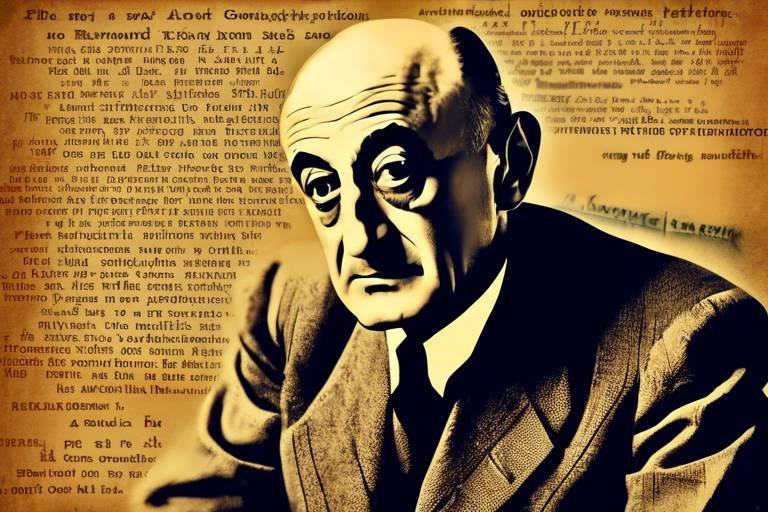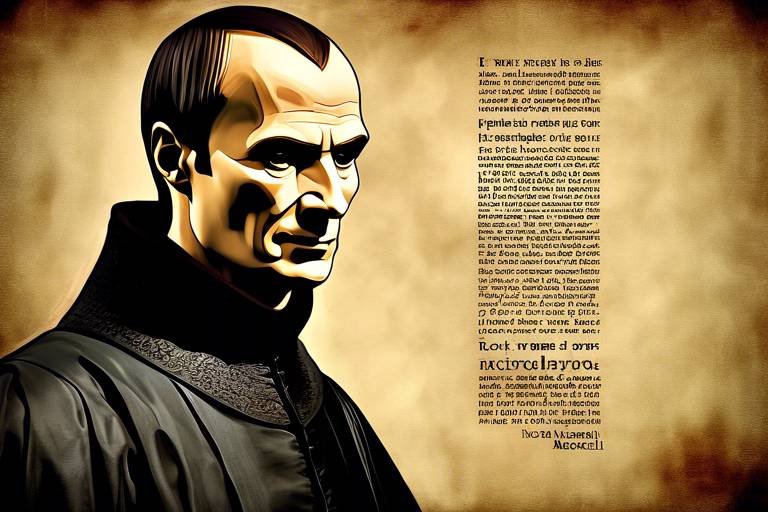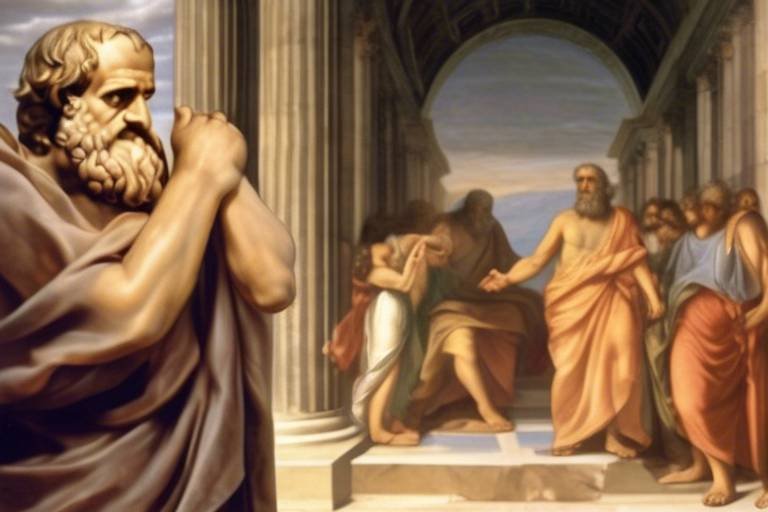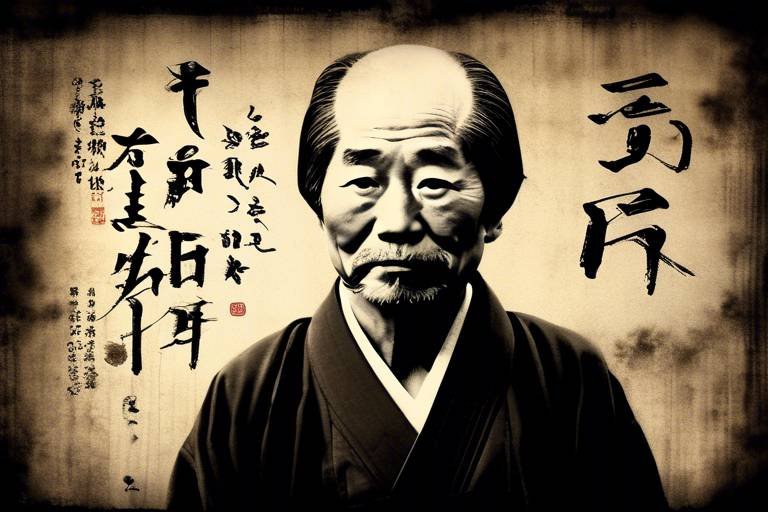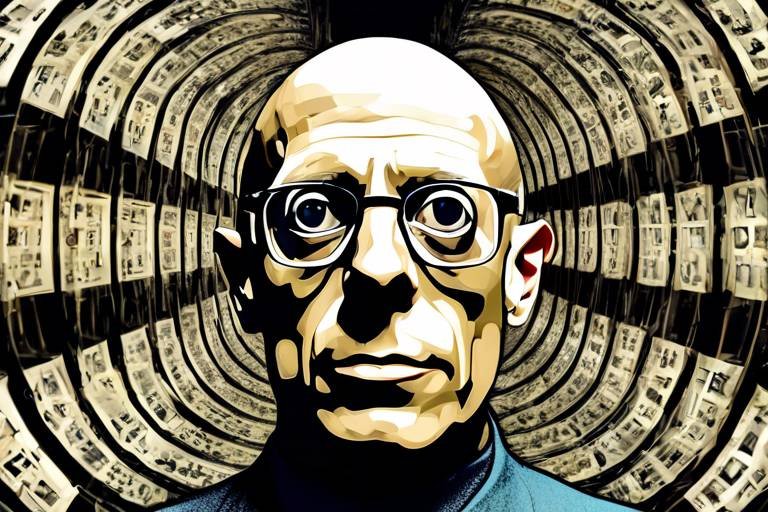Philosophy and Psychoanalysis - Thoughts of Otto Rank
When we dive into the realms of philosophy and psychoanalysis, the name Otto Rank emerges as a pivotal figure who bridged the gap between these two fascinating disciplines. Rank's thoughts are not just academic musings; they resonate with the very essence of human experience, creativity, and identity. His work challenges us to reconsider the way we view ourselves and our place in the world. Imagine standing at a crossroads, where the paths of philosophical inquiry and psychological understanding intersect. This is where Rank's insights shine, illuminating the complexities of our psyche and the narratives we create to make sense of our lives.
Rank's contributions extend beyond mere theory; they invite us to explore the depths of our consciousness and the narratives that shape our identities. He believed that understanding the human experience requires us to engage with both our inner worlds and the external realities we navigate. In a world increasingly driven by scientific rationalism, Rank's work serves as a reminder of the importance of subjective experience and the stories we tell ourselves. His philosophy encourages us to embrace our individuality and the creative forces that reside within us, urging us to assert our will against societal constraints.
At the heart of Rank's philosophy is the idea that every individual possesses the power to shape their own destiny. This belief is not just empowering; it is revolutionary. Rank contended that our will is the driving force behind personal development, guiding us through the labyrinth of life. He viewed the act of creation—whether it be through art, relationships, or personal endeavors—as a manifestation of this will. In Rank’s eyes, creativity is not merely a talent but a vital expression of the self, a way to assert one’s identity in a world that often seeks to homogenize.
As we explore Rank's thoughts, we begin to see how they intertwine with broader philosophical questions. What does it mean to be human? How do our stories shape our identities? These inquiries are not just abstract; they are deeply personal, resonating with each of us in our own unique journeys. Rank's insights challenge us to reflect on our own narratives and the myths we hold dear, prompting us to consider how these elements influence our understanding of self and others.
In summary, Otto Rank's philosophy and psychoanalysis offer a rich tapestry of ideas that compel us to examine the interplay between our inner lives and the external world. His emphasis on the will, creativity, and the role of myth in shaping identity provides a framework for understanding not just the individual, but the collective human experience. As we continue to explore the depths of his thought, we uncover valuable lessons about the nature of existence and the power of personal narrative.
- Who was Otto Rank? Otto Rank was an influential psychoanalyst and philosopher known for his contributions to the understanding of creativity, the will, and the role of myth in personal identity.
- What is the significance of the will in Rank's philosophy? Rank emphasized that the will is a crucial driving force in personal development and decision-making, shaping how individuals navigate their lives.
- How did Rank critique Freud's theories? While Rank embraced many of Freud's ideas, he also challenged certain aspects, particularly the emphasis on the unconscious, arguing for a greater focus on the individual's conscious will and creativity.
- What role do myths play in Rank's thought? Rank believed myths are essential tools for understanding human psychology, helping individuals construct their identities and connect with shared human experiences.

Otto Rank's Background
Otto Rank, born in 1884 in Vienna, Austria, was a pivotal figure in the development of psychoanalysis. His early life was marked by a rich cultural atmosphere that fostered his intellectual curiosity. Growing up in a Jewish family, Rank was exposed to a blend of artistic and philosophical influences that would shape his thoughts and theories later in life. He was particularly drawn to the world of literature and the arts, which would play a significant role in his understanding of human psychology.
Rank's educational journey began at the University of Vienna, where he initially studied philosophy and psychology. His fascination with the mind led him to Sigmund Freud, with whom he would later develop a complex relationship. Joining Freud's inner circle, Rank became one of the first members of the Vienna Psychoanalytic Society. His time with Freud was instrumental in shaping his views; however, it also laid the groundwork for his eventual divergence from Freudian orthodoxy.
Throughout his academic career, Rank was known for his innovative ideas that challenged traditional psychoanalytic concepts. He was particularly interested in the role of creativity and the will in human behavior, which he believed were essential for personal development. This emphasis on individual agency set him apart from many of his contemporaries, who often focused on deterministic views of human psychology.
Rank's background in the arts also influenced his approach to psychoanalysis. He saw art as a vital expression of the human experience, and he believed that understanding artistic creation could unlock deeper psychological truths. This perspective led him to explore the connections between myth, creativity, and personal identity, which became central themes in his later work.
As Rank's career progressed, he began to distance himself from Freud's theories, particularly the emphasis on sexuality and the Oedipus complex. Instead, he focused on the individual's capacity for self-determination and the importance of personal myths in shaping identity. This shift not only marked a turning point in his own work but also contributed to the broader evolution of psychoanalytic thought.
In summary, Otto Rank's background was a rich tapestry of cultural, artistic, and intellectual influences. His early experiences, education, and relationships with key figures in psychoanalysis laid the foundation for his groundbreaking ideas. By integrating philosophy and psychology, Rank opened new avenues for understanding the human psyche, emphasizing the importance of creativity, the will, and personal identity.

Key Concepts in Rank's Philosophy
Otto Rank's philosophy is a rich tapestry woven from various threads of thought, each contributing to a greater understanding of the human psyche. At the core of his ideas are concepts that challenge traditional psychological paradigms and invite us to reconsider the role of the individual in shaping their own destiny. One of the most significant themes in Rank's work is the importance of the will. He believed that the will is not just a passive force but a vital, dynamic element that drives personal development and decision-making. This perspective shifts the focus from external influences to the internal capabilities of individuals, empowering them to take charge of their lives.
Rank's emphasis on the will leads us to another fundamental concept: creativity. He argued that true artistic expression and innovation arise when individuals assert their will against societal norms and constraints. This assertion of will is not merely an act of rebellion; it is a profound declaration of one's identity and purpose. In Rank's view, creativity is an essential aspect of human existence, reflecting our desire to transcend limitations and connect with deeper truths. He saw creative acts as a means of personal liberation, allowing individuals to explore and express their innermost selves.
Moreover, Rank's exploration of the will extends into the realm of psychoanalysis. He posited that understanding a patient's will is crucial for effective therapeutic intervention. Traditional psychoanalytic approaches often focus on unconscious drives and past traumas, but Rank urged therapists to consider the conscious desires and intentions of the individual. This shift in focus not only aligns with his belief in the power of the will but also encourages a more collaborative therapeutic relationship. By recognizing and nurturing a patient's will, therapists can facilitate personal growth and transformation.
In summary, the key concepts in Rank's philosophy revolve around the interplay of will, creativity, and personal agency. His ideas challenge us to reconsider how we view ourselves and our potential, urging us to embrace our ability to shape our destinies. As we delve deeper into Rank's thoughts, we uncover a profound understanding of the human experience that resonates even today.
- What is the significance of the will in Otto Rank's philosophy?
The will is central to Rank's philosophy, representing the driving force behind personal development and the ability to shape one's destiny. - How does Rank link creativity to the will?
Rank argues that true creativity emerges when individuals assert their will against societal norms, allowing for authentic self-expression. - What was Rank's critique of traditional psychoanalysis?
Rank challenged the focus on unconscious drives, emphasizing the importance of understanding a patient's conscious will for effective therapy.

The Concept of the Will
When we dive into the depths of Otto Rank's philosophy, one concept emerges as a cornerstone: the will. Rank viewed the will not just as a passive trait but as an active force that propels individuals toward growth and self-realization. Imagine the will as a powerful engine, driving the vehicle of our lives. Without it, we might find ourselves stalled, unable to navigate the twists and turns of existence. Rank believed that the will is essential for personal development, shaping not only our choices but also our destiny.
To Rank, the will is intricately linked to our capacity for creativity. He argued that true artistic expression emerges when individuals assert their will against societal norms and constraints. It's like a bird breaking free from its cage; the moment it spreads its wings, it embraces its true essence. This connection between will and creativity underscores the idea that to be truly alive is to engage actively with the world around us. Rank posited that when individuals harness their will, they unlock a reservoir of potential that fuels their creative endeavors.
Moreover, Rank's perspective on the will challenges traditional psychoanalytic views. In conventional psychoanalysis, the focus often lies on unconscious drives and past traumas. However, Rank shifted the spotlight onto the conscious decisions individuals make in the present. He argued that understanding a patient's will is crucial for effective therapeutic intervention. Think of therapy as a journey; if the therapist can help the patient recognize and harness their will, they can navigate their path toward healing and personal growth more effectively.
In essence, Rank's concept of the will is not merely an abstract idea; it is a practical tool for understanding human behavior. It invites us to reflect on our own lives and ask, "How much am I asserting my will in my daily choices?" This introspection can lead to profound insights and, ultimately, a more fulfilling life. Rank's emphasis on the will encourages us to take ownership of our decisions, empowering us to shape our destinies rather than being passive participants in our own stories.
As we explore Rank's ideas, we can see the relevance of the will in various aspects of life, from personal relationships to creative pursuits. By recognizing the significance of our will, we can cultivate a greater sense of agency and purpose. In a world that often feels chaotic and overwhelming, Rank's insights remind us that we possess the power to steer our own course, making the journey of life not just a series of events but a meaningful and intentional experience.
- What is Otto Rank known for? Rank is known for his contributions to psychoanalysis, particularly his emphasis on the will and creativity.
- How does Rank's concept of the will differ from traditional psychoanalysis? Unlike traditional psychoanalysis, which focuses on unconscious drives, Rank emphasizes the conscious decisions individuals make and the importance of asserting one's will.
- Why is creativity linked to the will in Rank's philosophy? Rank believes that true artistic expression arises when individuals assert their will against societal norms, allowing them to unlock their creative potential.
- How can understanding the will impact personal growth? Recognizing and harnessing one's will can lead to greater agency in life, empowering individuals to shape their own destinies.

Will and Creativity
When we dive into Otto Rank's thoughts on will and creativity, we uncover a profound relationship that reshapes our understanding of artistic expression. Rank argued that the will is not merely a passive force; rather, it is an active, dynamic energy that fuels creativity. Imagine a river flowing through a landscape—its course is influenced by the terrain, yet it carves its own path, much like how our will navigates through societal expectations and norms. This analogy paints a vivid picture of how Rank perceived the interplay between will and creativity.
In Rank's view, true artistic expression emerges when individuals assert their will against the constraints imposed by society. He believed that creativity is an act of rebellion, a way for individuals to break free from the chains of conformity. This assertion of will allows artists to channel their inner thoughts and emotions into their work, resulting in creations that are not only original but also deeply personal. Think about the great artists throughout history—many of them faced societal pressures that sought to stifle their unique voices. Yet, it was their unwavering will that propelled them to create masterpieces that resonate with us even today.
Furthermore, Rank posited that the relationship between will and creativity extends beyond the realm of art; it permeates every aspect of human life. When individuals embrace their will, they unlock a reservoir of potential that can lead to personal growth and self-actualization. This process is akin to a seed breaking through the soil, striving towards the sun. Just as the seed must overcome obstacles to grow, individuals must confront their fears and societal limitations to fully realize their creative potential.
To illustrate this concept further, consider the following table that summarizes Rank's perspective on the relationship between will and creativity:
| Aspect | Will | Creativity |
|---|---|---|
| Definition | Active assertion of personal agency | Expression of unique ideas and emotions |
| Role in Society | Challenges societal norms | Breaks free from conformity |
| Impact on Individual | Facilitates personal growth | Leads to self-actualization |
In essence, Rank's exploration of will and creativity invites us to reflect on our own lives. Are we allowing our will to guide our creative endeavors, or are we stifling our potential by adhering too closely to societal expectations? By embracing our will, we can unlock the door to a world of creativity that is not only fulfilling but also transformative. So, the next time you find yourself hesitating to express your ideas, remember that your will is your greatest ally in the journey of creativity.
- What is the main idea behind Otto Rank's concept of will? Rank believed that will is a driving force in human psychology, essential for personal development and creativity.
- How does Rank connect creativity with the will? He argues that true creativity arises when individuals assert their will against societal norms, allowing for authentic self-expression.
- Why is understanding the will important in psychoanalysis? Recognizing a patient's will can lead to more effective therapeutic interventions and promote personal growth.

Will in Psychoanalysis
In the realm of psychoanalysis, Otto Rank introduced a revolutionary perspective by emphasizing the significance of the will in understanding human behavior and personal development. Unlike traditional Freudian views that predominantly focused on unconscious drives and instincts, Rank believed that the will is a powerful force that shapes our choices and actions. This idea invites us to consider: how much control do we really have over our lives? Rank argued that acknowledging and harnessing one’s will is essential for effective therapeutic intervention.
To Rank, the will is not merely a passive response to external stimuli; rather, it is an active agent in the pursuit of personal growth. He posited that individuals possess the innate ability to direct their lives, make choices, and assert their desires. This perspective challenges the notion that we are merely products of our past traumas or unconscious conflicts. Instead, Rank encourages both therapists and patients to focus on the conscious decisions that shape their identities and destinies. In this light, therapeutic sessions can transform into empowering experiences where patients reclaim their agency.
Rank's emphasis on the will also introduces a new dimension to the therapeutic process. By understanding a patient's will, therapists can tailor their approaches to meet the unique needs of individuals. This understanding can be broken down into several key aspects:
- Empowerment: Recognizing one's will fosters a sense of empowerment. Patients learn that they have the capacity to change their circumstances.
- Responsibility: With the power of will comes the responsibility for one’s choices. This realization can be both liberating and daunting.
- Creativity: The will is closely linked to creativity, as individuals assert their uniqueness in the world. This connection can lead to profound personal insights.
Moreover, Rank's focus on the will extends beyond the individual to encompass the therapeutic relationship itself. He believed that a successful therapeutic alliance is built on mutual respect for each person's will. This collaborative dynamic allows for a deeper exploration of personal issues, enabling patients to confront their fears and desires without judgment. Thus, the therapist's role shifts from being an authoritative figure to a supportive ally in the journey of self-discovery.
Ultimately, Rank's perspective on the will in psychoanalysis not only enriches our understanding of human behavior but also revitalizes the therapeutic process. By prioritizing the will, we can appreciate the intricate dance between our choices and our experiences, leading to a more holistic approach to mental health. This shift invites us to ask ourselves: Are we merely navigating through life, or are we actively shaping our own narratives?
- What is Otto Rank's main contribution to psychoanalysis?
Rank's primary contribution lies in his emphasis on the will as a driving force behind personal development, challenging traditional Freudian views. - How does Rank's view of the will differ from Freud's?
While Freud focused on unconscious drives, Rank highlighted the importance of conscious choice and personal agency in shaping one's life. - Why is the concept of will important in therapy?
Understanding a patient's will enables therapists to empower individuals, fostering a sense of responsibility and creativity in their healing process. - Can the will be developed or strengthened?
Yes, through therapeutic practices and self-reflection, individuals can cultivate their will, leading to greater self-awareness and personal growth.

Rank's Critique of Freud
Otto Rank's relationship with Sigmund Freud is often described as both collaborative and contentious. Initially, Rank was a fervent supporter of Freud's psychoanalytic theories, but as his own ideas began to mature, he started to voice critiques that would set him apart from the Freudian orthodoxy. One of the core aspects of Rank's critique was his emphasis on the will—a concept he believed was underrepresented in Freud's focus on the unconscious and instinctual drives. Rank argued that while Freud's theories provided a foundational understanding of human behavior, they were too centered on determinism and not sufficiently attentive to the individual's capacity for choice and agency.
Rank's critique can be broken down into a few key points:
- Focus on the Will: Rank posited that the will is not just a secondary force but rather a primary motivator of human behavior. He believed that individuals are not merely products of their past experiences but are actively shaping their futures through their choices.
- Creativity Over Sexuality: While Freud emphasized sexual drives as the primary motivators of human behavior, Rank argued that creativity and the drive to create were equally, if not more, important. This perspective shifted the focus from a deterministic view of human nature to one that celebrates the potential for personal growth and self-expression.
- Therapeutic Implications: Rank suggested that effective therapy should address a patient’s will and creative potential rather than solely exploring their unconscious conflicts. He believed that understanding a patient's desire to act and create could lead to more profound therapeutic outcomes.
Moreover, Rank's critique also extended to Freud's views on the Oedipus complex. While Freud saw this as a universal stage in human development, Rank argued that such a focus limited the understanding of human relationships and emotional development. He believed that the Oedipus complex was not a necessary phase for everyone, and by emphasizing it, Freud risked pathologizing healthy familial relationships.
In summary, Otto Rank's critiques of Freud not only highlight the philosophical rift between the two thinkers but also underscore a broader shift in psychoanalytic thought. By advocating for the significance of the will and creativity, Rank opened the door for future psychoanalysts to explore a more dynamic and less deterministic understanding of human behavior. His insights continue to resonate in modern therapeutic practices, emphasizing the importance of individual agency and creative expression in the journey of personal development.
1. What was Otto Rank's main critique of Freud?
Rank primarily critiqued Freud's emphasis on the unconscious and instinctual drives, arguing that the will and creativity play a crucial role in human behavior and personal development.
2. How did Rank's views differ from Freud's regarding creativity?
While Freud focused on sexual drives as primary motivators, Rank believed that the drive to create was equally important and essential for understanding human nature.
3. Why is Rank's critique significant in modern psychology?
Rank's emphasis on the will and creativity has influenced contemporary therapeutic practices, encouraging a more holistic understanding of individuals as active agents in their lives rather than passive recipients of past experiences.

The Role of Myth in Rank's Thought
Mythology holds a special place in the tapestry of human experience, and for Otto Rank, it was not merely an ancient narrative but a vital lens through which to understand our psyche. Rank believed that myths are more than just stories; they are essential tools that reveal profound psychological truths. These narratives echo the struggles, aspirations, and existential dilemmas that every individual faces. In many ways, myths serve as a mirror reflecting our collective unconscious, allowing us to explore the depths of our own identities and experiences.
Rank's fascination with mythology stemmed from his conviction that these stories encapsulate universal themes that resonate across cultures and epochs. He posited that myths articulate the shared human experience, providing insight into the archetypal struggles that define our existence. For instance, consider the hero's journey—a recurring motif in countless myths. This journey symbolizes the quest for self-discovery and personal growth, illustrating the challenges one must overcome to realize their potential. Just as heroes in myths confront dragons and traverse treacherous landscapes, individuals in real life face their own battles, both internal and external.
Furthermore, Rank argued that myths play a crucial role in shaping our personal identities. He suggested that individuals construct their identities through the narratives they embrace, consciously or unconsciously adopting the roles and themes found in the myths of their culture. This process is akin to wearing a mask in a theatrical performance; the stories we tell ourselves influence how we perceive our place in the world. By engaging with these myths, we not only connect with our heritage but also gain insight into our motivations and desires.
To illustrate this connection between myth and identity, consider the following table that highlights key myths and their psychological implications:
| Myth | Psychological Theme | Implications for Identity |
|---|---|---|
| The Hero's Journey | Self-discovery | Encourages individuals to embrace challenges as part of their growth. |
| Creation Myths | Origin and belonging | Fosters a sense of connection to one's culture and history. |
| Tragic Myths | Confronting fate | Highlights the struggle against external forces and the acceptance of mortality. |
Rank's exploration of myth also extends to the therapeutic realm. He believed that by understanding the myths that resonate with clients, therapists could unlock deeper insights into their struggles. For instance, if a client identifies with a particular myth, it can serve as a powerful framework for understanding their personal challenges and aspirations. In essence, myths become a bridge between the individual and the universal, facilitating a dialogue that can lead to healing and self-realization.
Ultimately, the role of myth in Rank's thought underscores the intricate relationship between culture, identity, and psychology. By engaging with myths, we embark on a journey of self-exploration, discovering not only who we are but also who we can become. In a world often dominated by rationality and empirical evidence, Rank's emphasis on the significance of myth serves as a poignant reminder of the enduring power of storytelling in shaping our lives and understanding our place in the cosmos.
- What is the significance of mythology in Otto Rank's philosophy? Mythology serves as a tool for understanding psychological truths and the human experience, illustrating universal themes that resonate across cultures.
- How do myths influence personal identity according to Rank? Myths help individuals construct their identities by providing narratives that shape their perceptions of self and their place in the world.
- Can understanding myths aid in therapeutic practices? Yes, by connecting clients with relevant myths, therapists can unlock deeper insights into personal challenges and facilitate healing.

Myth as a Psychological Tool
Otto Rank believed that myths are not just ancient stories; they are powerful psychological tools that help us navigate the complexities of human existence. Myths serve as a bridge between our individual experiences and the collective consciousness of humanity. By examining these narratives, we can uncover profound truths about our own lives and the universal struggles we all face. Think of myths as the GPS of the human psyche, guiding us through the maze of emotions, fears, and aspirations that define our existence.
Rank argued that myths encapsulate the shared experiences of humanity, reflecting our deepest desires, fears, and moral dilemmas. They resonate on an emotional level, allowing individuals to connect with the broader human experience. For instance, consider the myth of Prometheus, who defied the gods to bring fire to humanity. This story speaks to the struggle for knowledge and the consequences of challenging authority, themes that are still relevant today. Through such myths, we can explore our own motivations and the potential repercussions of our choices.
Moreover, myths can be seen as a mirror reflecting our internal conflicts and societal norms. They help us make sense of our lives by providing archetypal characters and situations that we can relate to. When we encounter a myth that resonates with us, it allows for a moment of introspection, prompting us to ask, “How does this story reflect my own journey?” This self-reflective process can be therapeutic, as it encourages individuals to confront their fears and aspirations in a safe, metaphorical context.
In Rank's view, the psychological significance of myths lies in their ability to articulate the collective unconscious, a term popularized by Carl Jung. This unconscious is filled with archetypes—universal symbols and themes that recur across cultures and time periods. By engaging with these archetypes through myths, individuals can tap into a deeper understanding of their own psyche. For example, the Hero's Journey, a common narrative found in many cultures, allows individuals to explore themes of courage, sacrifice, and transformation. Recognizing these patterns in our lives can lead to greater self-awareness and personal growth.
Furthermore, myths can also serve as a catalyst for creativity. When individuals engage with mythological stories, they often find inspiration for their own artistic expressions. By drawing on the rich tapestry of myths, artists, writers, and creators can channel their emotions and experiences into their work, creating something that resonates with others. This connection between myth and creativity underscores Rank's belief in the transformative power of storytelling.
In summary, Rank viewed myths as essential tools for psychological exploration and understanding. They offer insights into the human condition, allowing individuals to navigate their inner worlds and find meaning in their experiences. By engaging with myths, we can uncover the universal truths that bind us together, ultimately enriching our understanding of ourselves and the world around us.
- What role do myths play in modern psychology?
Myths help individuals understand their own experiences and emotions by providing relatable narratives that reflect common human struggles. - How can engaging with myths enhance personal growth?
By exploring the themes and archetypes found in myths, individuals can gain insights into their own lives, leading to greater self-awareness and personal development. - Can myths influence creativity?
Yes, myths often inspire artists and creators by providing rich narratives and themes that resonate with their own experiences.

Myth and Personal Identity
When we think about myth, we often picture ancient stories filled with gods, heroes, and epic quests. But what if I told you that these tales are more than just entertaining narratives? For Otto Rank, myths are fundamental to understanding personal identity. He believed that individuals construct their identities through the stories they resonate with, shaping who they are and how they see the world.
Rank argued that myths serve as a kind of psychological scaffolding. They provide frameworks through which we can interpret our experiences and understand our place in the universe. Just as a building needs a solid foundation, our identities are built upon the myths we embrace. These narratives offer not only meaning but also a sense of belonging, connecting us to others who share similar stories. In this way, myths become a bridge between the individual and the collective.
Consider how many of our personal stories echo the themes found in mythology. For instance, the hero's journey is a prevalent motif in countless cultures. It represents the struggle we all face in overcoming obstacles and achieving personal growth. When we identify with a hero's journey, we are not just engaging with a story; we are actively participating in a process of self-discovery. This connection to myth allows us to explore our fears, desires, and aspirations, ultimately helping us to define who we are.
Moreover, Rank highlighted the idea that myths are not static; they evolve with us. As we grow and change, so too do the stories we tell ourselves. This dynamic relationship between myth and identity means that we can continually reshape our understanding of ourselves. For example, someone who once identified with a tragic hero may come to see themselves as a mentor figure later in life. This transformation reflects the fluidity of identity, suggesting that we are not confined to a single narrative but are instead a mosaic of stories, experiences, and aspirations.
In essence, Rank's perspective on myth and personal identity invites us to reflect on the narratives we choose to embrace. Are they empowering? Do they inspire growth and creativity? By critically examining our myths, we can gain insight into our motivations and the forces that shape our lives. Rank encourages us to acknowledge the power of these stories, recognizing that they are not merely relics of the past but living elements that influence our present and future.
In conclusion, the interplay between myth and personal identity is a fascinating aspect of Rank's philosophy. Myths serve as both mirrors and maps, reflecting our inner worlds while guiding us on our journeys. By engaging with these narratives, we can better understand ourselves and the complex tapestry of human experience. So, what myths resonate with you? How do they shape your identity?
- What role do myths play in shaping personal identity?
Myths provide frameworks for understanding our experiences and help us connect with shared human themes, influencing how we perceive ourselves. - Can personal identity change over time?
Yes! Personal identity is dynamic, and as we evolve, the myths we identify with can also change, allowing for continuous self-discovery. - How can I explore my own myths?
Reflect on the stories that resonate with you, consider their themes, and think about how they relate to your personal experiences and identity.

Rank's Influence on Modern Psychoanalysis
Otto Rank's influence on modern psychoanalysis is nothing short of profound. His ideas have rippled through the fabric of psychological thought, creating waves that continue to resonate with therapists and scholars alike. While many may associate psychoanalysis primarily with Sigmund Freud, it's essential to recognize that Rank's contributions have shaped contemporary practices in significant ways. His emphasis on the individual's will and the importance of creativity has inspired a new generation of psychoanalysts to explore the depths of personal agency in therapeutic settings.
One of the most compelling aspects of Rank's legacy is his challenge to traditional psychoanalytic concepts. He argued that understanding a patient's will is crucial for effective therapy. This notion has led to a shift in how therapists approach their clients. Instead of merely delving into the unconscious mind, modern psychoanalysts often focus on empowering individuals to assert their will, thereby fostering a sense of ownership over their lives. This approach not only enhances the therapeutic relationship but also encourages clients to engage more actively in their healing process.
Rank's critique of Freud, particularly regarding the emphasis on sexuality as the primary driving force in human behavior, has also left a lasting mark. By shifting the focus toward the will and creativity, Rank opened the door for a broader understanding of human motivation. This has led to the development of various therapeutic modalities that prioritize personal growth and self-actualization. For instance, many contemporary therapies now incorporate elements of existentialism, which echoes Rank's belief in the importance of individual meaning-making.
To illustrate Rank's enduring influence, consider the following table that highlights key areas where his ideas have transformed modern psychoanalysis:
| Aspect of Psychoanalysis | Traditional View | Rank's Perspective |
|---|---|---|
| Role of the Unconscious | Primary driver of behavior | Influences behavior but not the sole factor |
| Focus of Therapy | Exploration of past traumas | Empowerment through will and creativity |
| Understanding of Identity | Static and predetermined | Dynamic and shaped by personal narratives |
Furthermore, Rank's exploration of mythology as a psychological tool has also been embraced in modern practices. Therapists today often utilize narrative therapy techniques, which encourage clients to reframe their personal stories and understand their identities through a mythic lens. This can be particularly empowering, as it allows individuals to see their struggles as part of a larger human experience, fostering resilience and creativity in the face of adversity.
In summary, Otto Rank's influence on modern psychoanalysis is a testament to the power of innovative thinking in the field of psychology. His ideas about the will, creativity, and the role of myth continue to inspire therapists and clients alike. By integrating these concepts into practice, modern psychoanalysts not only honor Rank's legacy but also pave the way for a more holistic and empowering approach to mental health.
- How did Otto Rank's ideas differ from Freud's?
Rank emphasized the importance of the will and creativity over Freud's focus on sexuality and the unconscious mind. - What is the significance of mythology in Rank's philosophy?
Rank viewed myths as essential for understanding personal identity and shared human experiences. - How do modern therapists incorporate Rank's ideas?
Many therapists focus on empowering clients through understanding their will and creativity, often using narrative therapy techniques.
Frequently Asked Questions
- What is Otto Rank known for in the field of psychoanalysis?
Otto Rank is renowned for his unique contributions to psychoanalysis, particularly his emphasis on the concept of the will and its role in personal development. He shifted the focus from Freud's deterministic views to a more dynamic understanding of human psychology, highlighting how individuals can shape their own destinies through the exercise of their will.
- How did Rank's background influence his theories?
Rank's early life and education played a pivotal role in shaping his perspectives. Growing up in a culturally rich environment and experiencing various philosophical ideas allowed him to develop a distinct approach to psychoanalysis that intertwined creativity, individuality, and psychological insight.
- What is the significance of the will in Rank's philosophy?
In Rank's philosophy, the will is seen as a central force driving personal growth and creativity. He argued that true artistic expression and personal fulfillment come from the ability to assert one's will against societal norms, making it essential for both psychoanalytic practice and individual identity formation.
- How did Rank critique Freud's theories?
While Rank initially embraced Freudian theories, he later critiqued several aspects, particularly the emphasis on sexuality as the primary motivator of human behavior. He believed that the will and personal agency were equally, if not more, important in understanding human psychology, leading to a significant shift in psychoanalytic thought.
- What role does mythology play in Rank's work?
Mythology is a crucial element in Rank's philosophy, serving as a tool for illustrating psychological truths. He believed that myths provide insight into shared human experiences and help individuals construct their identities, reflecting the collective unconscious themes that shape personal narratives.
- How does Rank's work influence modern psychoanalysis?
Otto Rank's ideas continue to resonate in contemporary psychoanalysis, particularly in therapeutic practices that emphasize the importance of personal agency and creativity. His focus on the will has influenced various psychological frameworks, encouraging a more holistic understanding of the individual in therapy.


